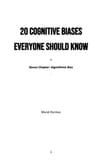What’s Covered
Murat Durmus, founder of AISOMA, distills psychological research into a highly accessible primer. This resource covers 20 major cognitive biases, including:
- Confirmation Bias (seeking information that supports existing beliefs)
- Availability Heuristic (overweighting what’s most recent or vivid)
- Anchoring Bias (overreliance on initial information)
- Sunk Cost Fallacy (persisting with failing projects due to past investment)
- Dunning-Kruger Effect (overestimating one’s competence when lacking expertise)
Each bias is explained clearly with real-world examples, such as decision-making in business, personal life, healthcare, education, and risk assessment.
A unique value-add is the bonus chapter on Algorithmic Bias, which connects human cognitive limitations to challenges in AI systems. This section highlights how unexamined human heuristics can migrate into machine learning models, resulting in systemic inequalities.
The discussion touches upon:
- Pre-existing biases being embedded into datasets.
- Emergent biases arising from new contexts or feedback loops.
- Technical biases introduced by design limitations.
The guide doesn’t just describe biases—it also implicitly stresses why awareness of them is crucial for ethical AI development, policy-making, and governance frameworks.
💡 Why it matters?
AI systems are only as good as the humans who design and train them. Understanding our own cognitive shortcuts is the first defense against encoding bias into algorithms that affect millions. This resource serves both as a personal introspection tool and a foundational text for building more accountable, transparent AI systems. It’s practical knowledge for anyone serious about AI governance.
What’s Missing
While highly readable, the resource could benefit from more structured recommendations for mitigating each bias, particularly in organizational and technical settings. A few deeper dives into bias quantification or bias correction methods for AI applications would bridge theory to practice even better—especially for policymakers, auditors, and engineers who need operational guidance.
Best For
- AI ethics professionals
- Governance and compliance teams
- Public policymakers dealing with algorithmic decision-making
- Developers aiming to improve model transparency
- Educators designing AI literacy courses


